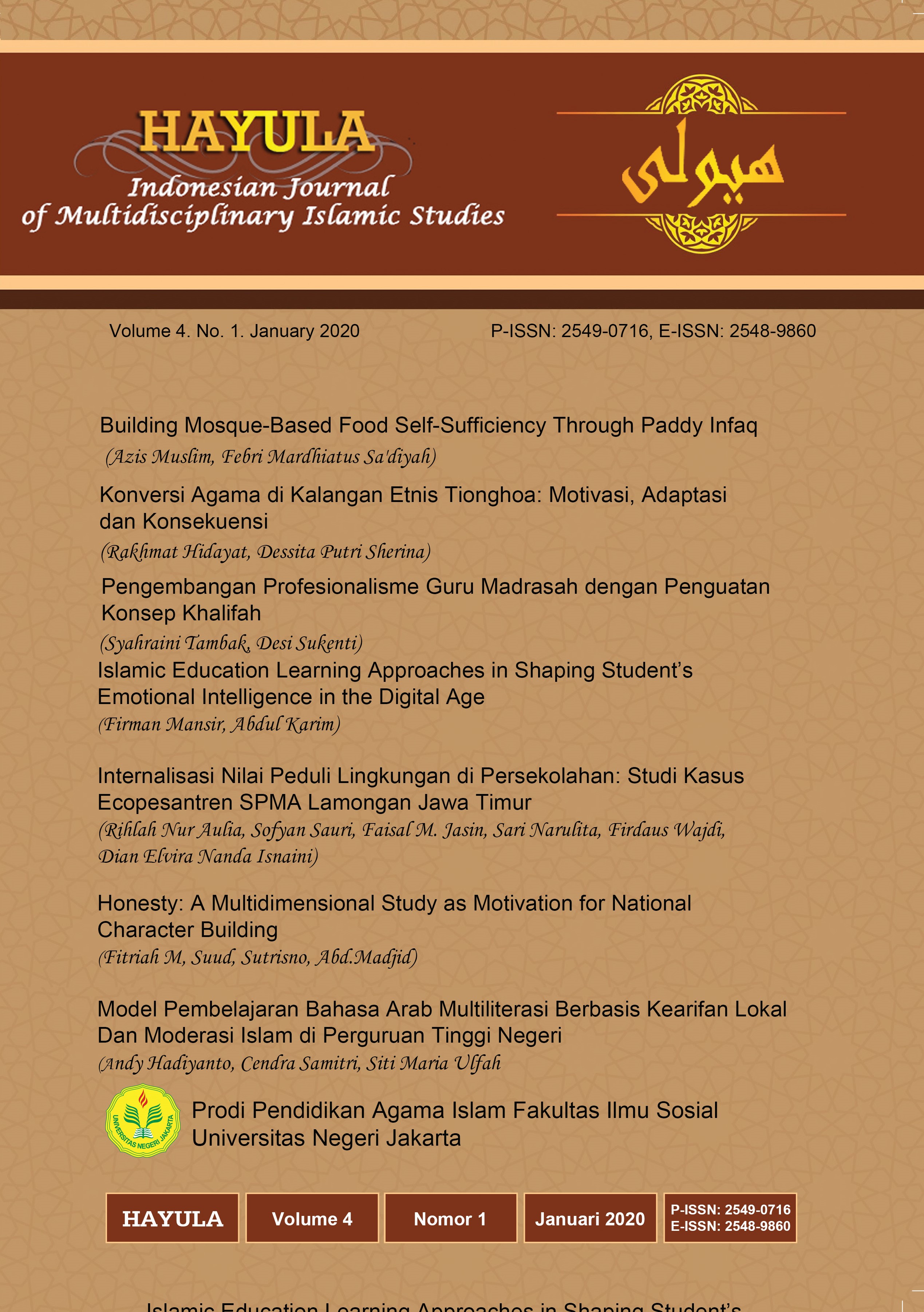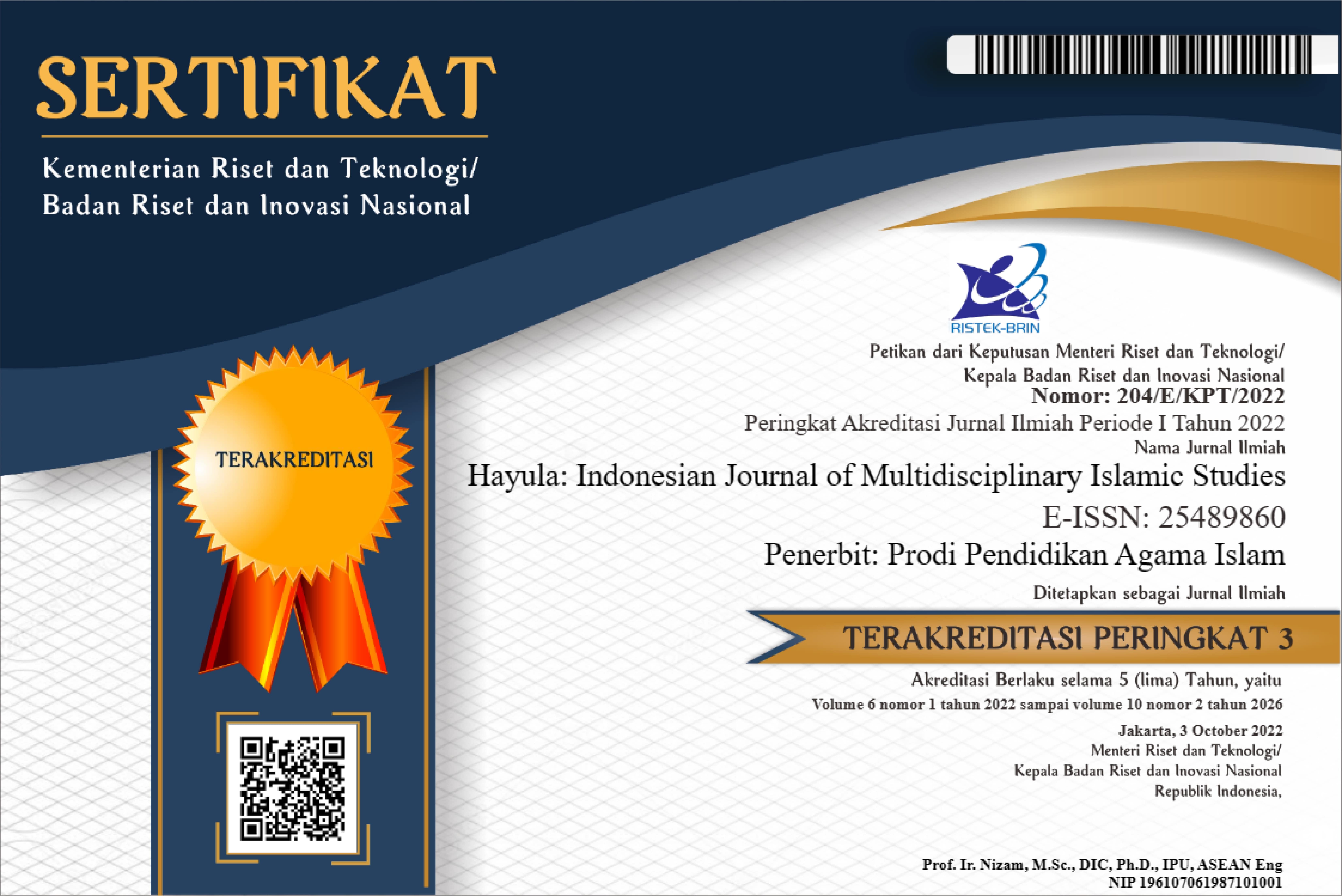Building Mosque-Based Food Self-Sufficiency Through Paddy Infaq
DOI:
https://doi.org/10.21009/004.01.01Keywords:
Food Self-Sufficiency, mosque, paddy infaqAbstract
The essence of empowerment was to build community’s consciousness of recognizing the existing potency and to utilize such potency to deal with the problems encountered. Therefore, community empowerment is highly determined by the community itself, rather than by outsiders facilitating. This research aimed to describe concept, implementation, and output of food self-sufficiency development conducted by Geneng Hamlet people in Jambakan Village of Bayat Sub District of Klaten Regency in solving the problem faced. The research was conducted using qualitative approach. Data was explored using observation, in-depth interview, and documentation. Data analysis was conducted using an interactive technique. The result of research showed that the concept of dealing with food vulnerability during dry season was designed by submitting infaq to Al-Ikhlas mosque in the form of dry rice in each of harvest seasons. In implementation domain, this collected infaq was managed professionally through rice barn (lumbung) to be distributed to its jamaah (community) in the form of loan and sympathetic care. The output was very positive as it could suffice the need for food during dry season, people can access the resource needed, and rice barn could help the weak group and the meritorious people in Geneng Hamlet.
References
Ashari., Saptana., and Purwantini, T.B. (2012). Potensi dan Prospek Pemanfaatan Lahan Pekarangan untuk Mendukung Ketahanan Pangan. Forum Penelitian Agro Ekonomi. Vol. 30, No. 1,: 13-30.
Badan Ketahanan Pangan Kementerian Pertanian. (2019). Petunjuk Teknis Bantuan Pemerintah: Kegiatan Pengembangan Lumbung Pangan Masyarakat Tahun Anggaran 2019. Jakarta: Badan Ketahanan Pangan.
Badan Perencanaan Pembangunan Nasional (Bappenas) dan Kementerian Negara Pemberdayaan Perempuan. (2007). Gender Analysis Pathway (GAP): Alat Analisis Gender Untuk Perencanaan Pembangunan. Jakarta: Deputi Bidang Sumber Daya Manusia dan Kebudayaan – Bappenas.
Gemari. (2007). Menag Canagkan Posdaya Berbasis Masjid di Pemalang. Edisi 74 Tahun VIII.Maret 2007.58-59.
Hamsah, U. (2017). Pemberdayaan Perempuan Berbasis Masjid Melalui Program Lumbung Padi di Desa Geneng Jambakan Bayat Klaten Jawa Tengah. Musawa. Vol. 16, No. 1.: 111-126.
Huda, M. (2009). Pekerjaan Sosial dan Kesejahteraan Sosial: Sebuah Pengantar. Yogyakarta: Pustaka Pelajar.
Maryuni, S. (2015). Implementasi Program Nasional Pemberdayaan Masyarakat (PNPM) Mandiri Perkotaan di Kota Pontianak. Spirit Publik. Vol. 10, No. 1.: 19-30.
Mulyani, A., Ritung, S., and Las, I. (2011). Potensi dan Ketersediaan Sumber Daya Lahan untuk Mendukung Ketahanan Pangan. Jurnal Litbang Pertanian. Vol. 30, No. 2,: 73-80.
Muslim, A. (2016). Pemberdayaan Ekonomi Masyarakat Miskin di Yayasan Perjuangan Wahidiyah. Inferensi: Jurnal Penelitian Sosial Keagamaan. Vol. 10, No. 2.: 335-358.
Muslim, A., Karsidi, R., Wijaya, M., and Joebagio, H. (2014). A Mosque-Based Economic Empowerment Model for Urban Poor Community. International Journal of Social Science Research. Vol. 2, No. 2.:80-93.
Rauf, A.W., and Lestari, M.S. (2009). Pemanfaatan Komoditas Pangan Lokal Sebagai Sumber Pangan Alternatif di Papua. Jurnal Litbang Pertanian. Vol. 28, No. 2.: 54-62.
Sukari., Purwana, B.H.S., and Mudjijono. (2016). Kearifan Lokal Dalam membangun Ketahanan Pangan Petani di Desa Lencoh, Selo, Boyolali Jawa Tengah. Yogyakarta:Balai Pelestarian Nilai Budaya.
Sukidjo. (2011). Model Evaluasi Program Pengentasan Kemiskinan Pada PNPM Mandiri Perkotaan. Disertasi. Yogyakarta: Universitas Negeri Yogyakarta. http://eprints.uny.ac.id/42376/
Additional Files
Published
How to Cite
Issue
Section
License
Authors who publish with this Journal agree to the following terms:
- Author retain copyright and grant the journal right of first publication with the work simultaneously licensed under a creative commons attribution licensethat allow others to share the work within an acknowledgement of the work’s authorship and initial publication of this journal.
- Authors are able to enter into separate, additional contractual arrangementfor the non-exclusive distribution of the journal’s published version of the work (e.g. acknowledgement of its initial publication in this journal).
- Authors are permitted and encouraged to post their work online(e.g. in institutional repositories or on their websites) prior to and during the submission process, as it can lead to productive exchanges, as well as earlier and greater citation of published works.
Users/public use of this website will be licensed to CC BY







